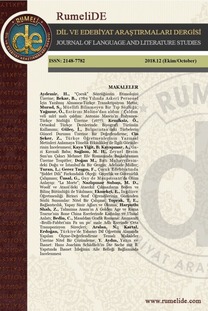Michel Houellebecq’in Soumission adlı romanı ve “kadın”
Çağdaş Fransız yazınının “kışkırtıcı” yazarı Michel Houellebecq’in, 2015 yılında, tam da Charlie Hebdo saldırılarının gerçekleştiği gün yayımlanan Soumission adlı romanı, yazarın kendisi gibi kışkırtıcı bir roman olarak dikkat çekmektedir. Romanın yazıldığı döneme çok da uzak olmayan bir geleceği anlatan bu distopik kurguda, 2022 Fransa’sında yapılan seçimlerde, Müslüman Kardeşlik adlı partinin adayı Mohammed Ben Abbes’in, Marine Le Pen ile girdiği yarıştan galip çıkması ve Fransa’nın, Fransız Cumhuriyeti’nin yaşadığı siyasi ve özellikle de toplumsal değişim işlenir. Libération gazetesi edebiyat eleştirmeni Philippe Lançon’un “islamofobik, islamofil, kadın düşmanı, maço, hatta yer yer pedofil bir roman” gibi okunabileceğini belirttiği bu roman, eleştirmenin devamında eklediği gibi “aynı zamanda, bir yandan eğlenerek, haklı ya da haksız korkularımız üzerine düşünmemizi sağlayan üzücü bir fars, kışkırtıcı bir eğlence olarak da okunabilir”. Tek bir eleştiride arka arkaya gelen bu ifadeler aslında romanın “çoğul” yaklaşımlara (approche) açık olduğunu da göstermektedir. Yayımlandığı günden itibaren, Houellebecq’in romanı, siyasi ve dini yaklaşımlar çerçevesinde irdelenmiş ve ne islamofobik, ne de islamofil çevreler bu romanı “kışkırtıcı bir eğlence” olarak nitelendirebilmiştir. Roman, tahmin edileceği gibi iki tarafın da tepkisini çekmiştir. Bu çalışmada romanı, Soumission’dan önce yazdığı romanlarda da dikkat çeken bir özellik olarak karşımıza çıkan ve kadınlara karşı “cinsiyetçi” bir yaklaşım olarak nitelendirilebilecek olan “yazarın kadınlar konusundaki tutumu” çerçevesinde inceleyeceğiz. Houellebecq’in distopik Fransa’sındaki en dikkat çekici değişimlerden biri, kadınların toplumsal yaşamdan – eğitimden, iş dünyasından, sokaklardan – yavaş yavaş silinmesidir çünkü yazarın kurgusunda kullandığı dini görüş, kadınların eğitim almalarını, çalışmalarını gereksiz görmektedir. Çalışmamızda, Houellebecq’in kurguladığı yakın geleceğin “kadınlar” konusunda nasıl bir mesaj taşıdığını irdelemeye, yazınsal evreninde “kadın” karakterlerin gelişiminin – ya da gelişmemesinin – cinsiyetçilik ile açıklanıp açıklanamayacağını örneklendirerek ele almaya çalışacağız.
Anahtar Kelimeler:
Michel Houellebecq, Soumission, kadın, cinsiyetçilik, siyasi kurgu
Michel Houellebecq’s Submission and “woman”
The novel Submission by the contemporary French author Michel Houellebecq, published in 2015, on the very day of the terrorist attack at Charlie-Hebdo, is a provocative novel just like its author. This dystopian fiction describes the near future, the year 2022 when the leader of the Muslim Brotherhood political party, Mohammed Ben Abbes wins the elections against Marine le Pen. We can read in the novel the political but above all social changes taking place in France. Literary critic Philippe Lançon writes in his article published in Liberation that this novel can be read as an "Islamophobic, Islamophile, misogynist, macho, and even, at times, almost pedophile novel" and he adds that it can also be read as “a sad farce, a provocative entertainment, which allows us to reflect on our fears, justified or not while having fun”. These many attributes that qualify the novel shows how much it lends itself to multiple approaches. The novel was treated within the framework of political and religious approaches and it would be fair to say that neither Islamophobic nor Islamophile circles considered it provocative “entertainment”. The novel provoked many strong reviews. This paper proposes to study the novel within the framework of the attitude of the narrator and the characters concerning the status of woman. Indeed, the fact that the change of political regime leads to the total erasure of women from the public space is one of the major changes that can be seen in France after the elections. Islam as applied by the Muslim Brotherhood considerably reduces women's access to studies and erases them from professional circles by reducing them to their role as wives. We will seek to study the role of women, and the evolution of female characters in the novel by trying to understand if it would be possible to interpret this role as sexism, even to the misogyny of the author.
Keywords:
Michel Houellebecq, Submission, woman, sexism, political fiction,
___
- Atwood, M. (2017). The Handmaid’s Tale, Penguin/Vintage.
- Bardolle, O. (2004). La littérature à vif (le cas Houellebecq), L’esprit des péninsules.
- Booth, W.C. (1983). The Rhetoric of Fiction, The University of Chicago Press.
- Djavann, C. (2015). Houellebecq et la soumission des femmes. Le Figaro, 07.01.2015. https://www.lefigaro.fr/livres/2015/01/07/03005-20150107ARTFIG00034-chahdortt-djavann-houellebecq-et-la-soumission-des-femmes.php, 20.11.2021 tarihinde görüntülendi.
- Houellebecq, M. (1997). Rester vivant et autres textes, Editions Flammarion.
- Houellebecq, M. (2015). Soumission, Editions Flammarion.
- Houellebecq, M. (2015/2). Dieu ne veut pas de moi. Revue des Deux Mondes, juillet-août, 8-33. https://www.jstor.org/stable/44435844, 03.03.2020 tarihinde görüntülendi.
- Lançon, P. (2015). Michel Houellebecq et le cas Soumission. Libération, 06.01.2015. https://next.liberation.fr/livres/2015/01/06/michel-houellebecq-et-le-cas-soumission_1174350
- Lapaque, S. (2016). Pourquoi les Français plébiscitent Michel Houellebecq. Le Figaro, 17.02.2016.
- https://www.lefigaro.fr/vox/culture/2016/02/17/31006-20160217ARTFIG00350-pourquoi-les-francais-plebiscitent-michel-houellebecq.php
- Lenze, U. (2019). Kadın Yazarlar Yılı. https://www.goethe.de/ins/tr/tr/kul/sup/lit/fra/21705691.html, 14.05.2022 tarihinde görüntülendi.
- Mills, M.B. (2016). The Oxford Handbook of Feminist Theory. Oxford University Press.
- Morrey, D. (2009). Sex and the Single Male: Houellebecq, Feminism, and Hegemonic Masculinity. Yale French Studies, No. 116/117, 141-152.
- Nilsson, P-E. (2019). Fuck Autonomy: Neo-Orientalism and Abjection in Michel Houellebecq’s Soumission. European Review, Vol.27, No.4, 600-614.
- Özdere, A.C. (2021). İtaat: Houllebecq’in karanlık senaryosu. https://www.sandvic.com.tr/2021/03/25/itaat-houellebecqin-karanlik-senaryosu/14.05.2022 tarihinde görüntülendi.
- Rooney, E. (2006). The Cambridge Companion to Feminist Literary Theory. Cambridge University Press.
- Sert, S. (2021). Yetişkin masalı gibidir distopya. Evrensel, 02.03.2021. https://www.evrensel.net/haber/427174/yetiskin-masali-gibidir-distopya, 10.04.2022 tarihinde görüntülendi.
- Sturli, V. (2017). “Plus vous serez ignoble, mieux ça ira.” Stratégie de l’invective dans deux romans de Michel Houellebecq. Revue italienne d’études françaises [En ligne], http://journals.openedition.org/rief/1449 ; DOI : https://doi.org/10.4000/rief.1449, 17.04.2022 tarihinde görüntülendi.
- Thuen, T.S. (2007). L’amour et la tendresse féminine selon Houellebecq. University of Oslo.
- ISSN: 2148-7782
- Yayın Aralığı: Yılda 6 Sayı
- Başlangıç: 2014
- Yayıncı: Yakup YILMAZ
Sayıdaki Diğer Makaleler
Evet, ich will! (2009) Film afişlerindeki kültürel kodların göstergebilimsel çözümlemesi
Çocuk dil ediniminde söz dizimi gelişimi
Dönem dizilerinde karakter betimlemeleri: Payitaht Abdülhamid
Viktorya dönemi edebiyatında 'Yeni Kadın' a panoramik bir bakış
Masallarda geçen ikilemelere anlambilimsel bir bakış
Derya YÜCEL ÇETİN, Zeynep CİN ŞEKER
B-M. Koltès’in Batı Rıhtımı oyununda zıt örgenler
Eşik bekçiliği ve transediting kavramları odağında haber çevirisi: Euronews örneği
Mualla Elif DURMAZ, Vasfiye GEÇKİN
